How To Treat A Dog Ear Infection Without A Vet
To keep the lights on, we receive affiliate commissions via some of our links. Our review process.
Dogs suffer from ear infections much more frequently than humans because of the shape of their ear canals. Our furry friends with long, floppy ears are even more prone to ear troubles. And some dogs suffer from chronic recurring ear infections. Fortunately, you can relieve the pain and itchiness with some over-the-counter (OTC) and home remedies. However, it’s never a good idea to treat a dog ear infection at home without first consulting your veterinarian.
At A Glance: Our Top Picks For OTC Remedies
Causes And Types Of Ear Infections In Dogs
The most common causes of dog ear infections are bacteria or yeast (fungi) that are trapped in the ears. But they can also be caused by wax buildup, allergies, a foreign object, or ear mites (usually only in puppies). Hormonal disorders such as hypothyroidism and Cushing’s disease can also cause chronic ear infections.
Dog ear infections are classified into three types. Otitis externa is inflammation that affects the outer or external part of the ear canal. This is the most common type of ear infection in dogs. And fortunately, it’s in the area of the dog’s ear that you can see. Otitis media and otitis interna involve infections of the middle and inner ear canal. Most often, these are a result of otitis externa spreading further into the canal.
Ear Infection Symptoms
Some dogs with long, floppy ears and dogs who swim often are more prone to ear infections. And according to the American Veterinary Medical Association (AVMA), otitis externa is especially prevalent in Cocker Spaniels, Poodles, and German Shepherds.
Ear infections can be quite painful and itchy for our pups, so you’ll likely first notice symptoms of discomfort. But not all dogs exhibit these signs, so it’s important to check your dog’s ears regularly for visible signs of infection within the ear. If left untreated, ear infections can lead to serious problems, including permanent hearing loss.
- Head shaking
- Pawing or scratching at the ear
- Rubbing the ear on the ground or furniture
- Dark discharge
- Wax buildup in the ear canal
- Foul odor
- Redness and/or swelling of the ear canal
- Scabs or crusting in the ear
When It’s Time For Immediate Vet Care
As dog ear infections worsen, they can move to the inner ear, causing a loss of balance, facial nerve damage, and other problems. Inner ear infections can be serious, causing a damaged or burst eardrum and deafness. Signs include:
- Head tilting
- Lopsided gait
- Stumbling
- Walking in circles
- Drooling from the side of the mouth
- Difficulty eating and dropping food
- Drooping eyelids, nostrils, and lips on the affected side
If your dog is exhibiting any of these signs, you should see your vet immediately. Your dog may need prescription antibiotics, anti-inflammatory medications, or other veterinary treatment to prevent permanent damage.
Dogs with ear infections are also prone to ear hematomas which are caused by excessive head shaking or ear scratching. Ear hematomas occur when blood vessels within the ear flap (pinna) burst and appear as blood-filled pockets with intense swelling on the inside of the pinna. Ear hematomas are incredibly painful and can cause permanent scarring or disfigurement of the ear. So they usually require drainage and pain management from a vet.
How To Treat A Dog Ear Infection Without A Vet
Our first and foremost advice is to seek veterinary care if your dog has never had an ear infection. Why? Dog ear infections can be bacterial or fungal, and it takes a vet diagnosis to determine which type your pup has. Effective treatment depends on the cause of the infection and how severe it has become.
If your pup has had numerous ear infections and you and your vet have nailed down the cause, then it could be okay for you to treat an ear infection at home. Still, you should get a green light from your vet to administer any ear infection treatment on your own.
The first step in treating dog ear infections is cleaning the ear canal (see below for the best cleansers and video instructions). Once cleaned, allow it to dry for approximately 10 minutes. Then administer your vet-approved OTC treatment.
Best Over-The-Counter Medicated Treatments
We’ve chosen these products based on the active ingredients and reviews from hundreds to thousands of pet parents who say they’re effective.
Most Popular: Zymox Pet King Brand Otic Enzymatic Cleaner
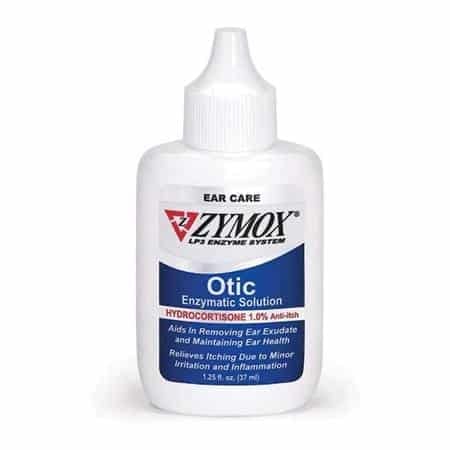
Zymox is a gentle, no-sting formula that helps relieve ear infections, swimmer’s ears, smelly ears, and more. It includes three active enzymes that have been shown to have antibacterial, antifungal, and antiviral properties, as well as 1% hydrocortisone for itch and inflammation relief. You can use it as a cleaner and treatment. Zymox gets amazing reviews from pet parents.
Price (1.25 fl oz): $23.79
Best Value: Veterinary Formula Clinical Care Ear Therapy
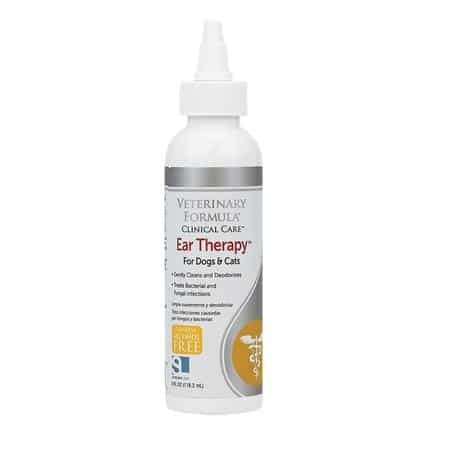
These vet-formulated ear drops are alcohol-free and medicated with ketoconazole, which is commonly used to treat various fungal infections in dogs. It also contains benzoic acid, an antifungal, as well as lactic acid and salicylic acid to help reduce excess inflammation, foul odors, and moisture in the ear canal. You can also use it as a regular ear cleaner to help prevent infections.
Price (4 fl oz):
$9.99
Best Medicated Ingredients: Vetnique Labs Oticbliss Medicated Ear Flush
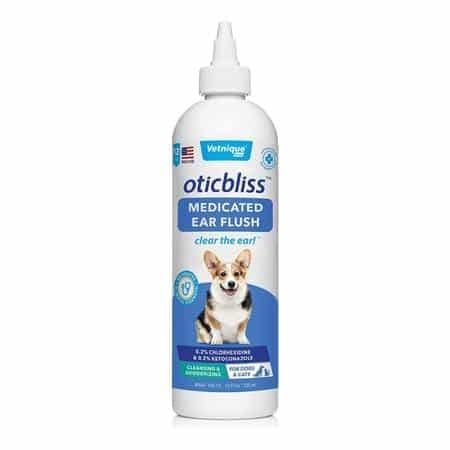
Oticbliss is medicated with 0.2% chlorhexidine, a disinfectant that decreases bacteria in the ears, and 0.2% ketoconazole, an antifungal designed to treat yeast ear infections. This vet-formulated solution also contains lactic acid to reduce moisture and soothing aloe vera leaf juice. After using this flush, you can also apply Oticbliss’s ear drops which contain 1% hydrocortisone to relieve itching, swelling, and redness.
Price (4 fl oz):
$12.99 ($3.25 / Fl Oz)
Natural Home Remedies For Dog Ear Infections
If you’re wondering how to treat a dog ear yeast infection without a vet, some home remedies could help. Again, get your vet’s approval before using any home remedy. Although you may see contrary information online, rubbing alcohol, hydrogen peroxide, and witch hazel aren’t recommended by veterinarians. They can cause major irritation to your dog’s ear canal and dry it out too much.
Mullein And Garlic Oil
Some holistic veterinarians recommend a garlic and mullein oil mixture to help treat mild ear infections. Numerous studies have shown that garlic extract is effective against bacteria, fungi, and viruses, and other studies have found that mullein leaf possesses antibacterial properties.
You can make a mixture at home or purchase Herb Pharm’s Mullein Garlic Oil, made from organically grown herbs. To make your own to have on hand, place mullein leaves and flowers in a small jar, add a couple of garlic cloves, and cover with olive oil. Let the mixture sit for two to three weeks and strain. Put a few drops into the affected ear canal and massage gently every day until symptoms improve.
Oregano Oil
Research has found that the oregano herb and its component carvacrol have powerful antibacterial and antifungal properties, even against known antibiotic-resistant bacterial strains in dogs with otitis externa. As a treatment for dog ear infections, essential oregano oil must be heavily diluted in carrier oil (e.g., olive oil) to prevent ear canal damage and extreme pain.
Holistic vets warn against making your own oregano oil for this reason. But you can find safe formulas, like Vetercure Oregano Oil Oral Drops for Pets, which many pet parents have found effective for their dog’s stubborn ear infections. Just be sure you’re not applying essential oregano oil or oil of oregano products into your pup’s ears.
Apple Cider Vinegar
A common home remedy for dog ear infections, apple cider vinegar can help kill yeast and fight bacteria due to its acid content. It’s also a good homemade remedy for smelly dog ears. Soak a cotton ball in a mixture of equal parts apple cider vinegar and distilled water, wipe it around your dog’s outer ear canal, and gently massage the ear. You can repeat this until the cotton ball comes out clean.
Green Tea
Green tea has antioxidant properties that can help reduce inflammation and pain. Steep two bags of organic green tea in one cup of boiled water for several minutes. Let it cool, and then soak up the tea with a cotton ball. Rub the cotton ball around the outer ear canal.
Prevention: Keeping Your Dog’s Ears Clean & Dry Are Key
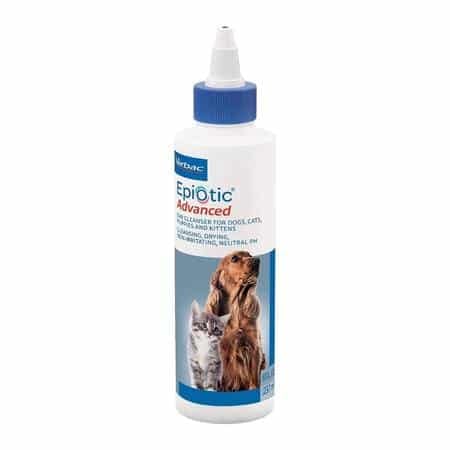
Keeping your furry friend’s ears clean can go a long way toward preventing ear infections. You should clean your dog’s ears at least every few weeks using a liquid solution or ear flushes, such as the vet-recommended Virbac EPIOTIC Advanced Ear Cleanser or PetHonesty’s Otic Ear Cleaner. If you’re looking for a natural remedy for cleaning dog ears, you may want to consider Vet Organics EcoEars Dog Ear Cleaner.
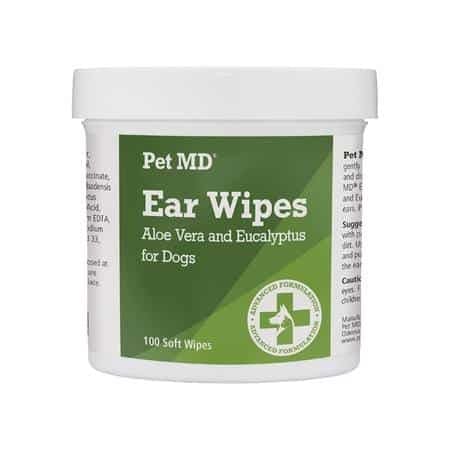
For pups whose ears get dirty frequently, we recommend using PetMD Ear Wipes every day to remove debris and reduce wax buildup. Another preventative measure is to dry your pup’s ears after a bath or after swimming because bacteria and yeast thrive in moisture.
It’s important to keep in mind that vigorous cleaning of an infected external ear canal can backfire on you. If your pup already has otitis exterma, extensive cleaning can sometimes lead to a middle or inner ear infection.
The video below is an excellent tutorial on how to clean dog ears at home naturally and gently using an ear cleanser solution.
Frequently Asked Questions
Here are some of the questions we most often see from our readers about dog ear infections.
Will A Dog Ear Infection Clear Up On Its Own?
The short answer is no. Most cases of dog ear infections require treatment. As soon as you suspect an ear problem with your pup, don’t delay treating it. Untreated external ear infections can spread to the middle and inner ear, causing serious problems and even deafness.
How Long Does It Take For A Dog Ear Infection To Go Away?
With early treatment, dog ear infections usually clear up in one to two weeks. However, more severe infections or those caused by an underlying health issue could take months to resolve.
Consider Switching Your Dog’s Diet And Adding Supplements
Keeping your pup’s immune system strong is key to fighting off infections and other ailments. So you may want to consider feeding your furry friend a healthier diet to strengthen his immune system. Vets often recommend a diet change for dogs with chronic recurrent ear infections. See our reviews of fresh dog food delivery services and all-natural dog food for your best options.
Giving your pup a daily supplement of omega-3 fish oil can also help, particularly if allergies are the cause of your dog’s ear infections. You may also want to consider a daily probiotic supplement for dogs. Improving your pup’s gut health can be a huge boost for his immune system.
Tagged With: Comparison, Ears




